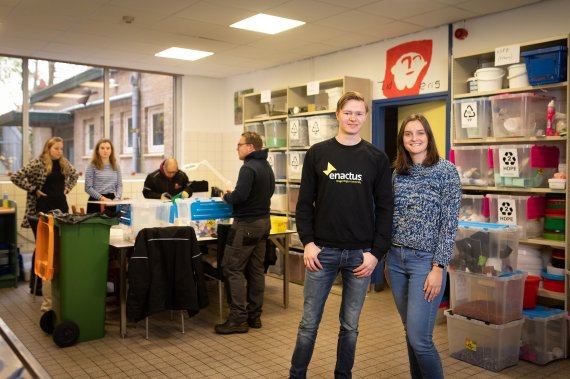Enactus Wageningen founder Koen van den Berg and chair Simone Penris in the former Unitas building, where people with a disability recycle plastic under supervision. Photo Sven Menschel
In the kitchen of the former Unitas headquarters on the Generaal Foulkesweg, five people a cognitive disability are cleaning up and shredding plastic waste to melt it into bars. These will be used to make balcony furniture. ‘We create work like this for people with limited job prospects, and at the same time we give used plastic a second life,’ says MSc student of Bioinformatics Koen van den Berg (21). He is one of the founders of the Wageningen branch of Enactus, as well as heading this Enactus project, which is called UniPlastic.
Once a project gets going, it can become a separate business.
World Cup in social entrepreneurship
Enactus is a not-for-profit organization active in cities with student communities in 36 countries. Most of the Dutch university cities have had a local branch for years now. Van den Berg and other WUR students established the Wageningen branch in summer 2017. The branches keep in touch and help each other out. But they also compete with each other once a year in a national competition, the winner of which goes on to the Enactus World Cup. Enactus Wageningen already has 31 members, who between them have a variety of ideas for sustainable small businesses. Three of these ideas have already resulted in actual projects such as UniPlastic.
Not that Wageningen students with an entrepreneurial bent had nowhere to go before Enactus came on the scene, says Van den Berg. ‘There is StartHub, of course, but that focuses mainly on helping Master’s and PhD students build up a profitable business. We concentrate on Bachelor’s students and on social entrepreneurship.’ There should be easily accessible opportunities to learn entrepreneurial skills, adds Simone Penris (21), an MSc student of Food Technology and currently chair of Enactus. ‘We are a kind of playground for learning entrepreneurship. It is not a problem is something goes wrong, because you learn most from your mistakes.’
Insectenbrownies
The members of Enactus get together every Thursday evening in the town ‘living room’ Thuis, to see how to take their projects to new levels. The goal of these projects is to have an impact. ‘Impact on social issues of sustainability, for instance,’ says Van den Berg. As an example, the students behind Insect Impact try to lower the threshold for eating insects by developing baking mixes for mealworm brownies. ‘The idea is that insects are a more sustainable source of protein than meat, but that people are still scared of eating insects,’ says Penris. ‘By making a brownie mix with them, you make it easier for people to sample insects as food.’
The third Enactus project, Locus, seeks to solve two problems at the same time: shortage of accommodation and loneliness. Penris: ‘Many elderly people are lonely and many students have trouble finding rooms. Locus works as a matchmaker, matching students looking for rooms with lonely elderly people.’ Locus is still searching for the right approach but has already made one match: a WUR student moved in with an elderly man on 1 December.
‘Enactus Wageningen has only just got started and is still quite small,’ says Van den Berg. ‘In other cities you can see that once a project gets going, it eventually cuts loose from Enactus and becomes a separate business. And that’s the ultimate aim, of course: to create something that is sustainable and keeps on going.’
For more information seewww.enactuswageningen.nl.

